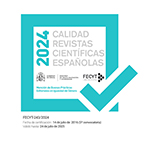Estudio cualitativo sobre factores sociales que influyen en la inclusión social de personas con sordoceguera
Resumen
El artículo recoge el resultado de una investigación cualitativa que descubre cómo influyen determinados factores sociales en la autonomía e inclusión social de las personas sordociegas. Se han seleccionado cuatro grandes ámbitos sociales a observar en base a su relevancia en la vida de estas personas: la familia, la participación social, el acceso a recursos y a las tecnologías de la información y comunicación. A través de once entrevistas en profundidad a personas sordociegas de distinto perfil (edad, sexo, estado civil y situación laboral) se han podido establecer 18 factores que contribuyen positivamente (9) o negativamente (9) en el desarrollo de la autonomía personal e inclusión social de estas personas. Las conclusiones del artículo suponen una aportación de evidencia de gran valor tanto en el ámbito de las políticas sociales destinadas a la atención y promoción de las personas con discapacidad, como en el ámbito de la intervención social, especialmente en aquellos procesos cuyo objetivo sea el fomento de la autonomía personal e inclusión social de las personas sordociegas.
Descargas
Descarga artículo
Licencia
La revista Cuadernos de Trabajo Social, para fomentar el intercambio global del conocimiento, facilita el acceso sin restricciones a sus contenidos desde el momento de su publicación en la presente edición electrónica, y por eso es una revista de acceso abierto. Los originales publicados en esta revista son propiedad de la Universidad Complutense de Madrid y es obligatorio citar su procedencia en cualquier reproducción total o parcial. Todos los contenidos se distribuyen bajo una licencia de uso y distribución Creative Commons Reconocimiento 4.0 (CC BY 4.0). Esta circunstancia ha de hacerse constar expresamente de esta forma cuando sea necesario. Puede consultar la versión informativa y el texto legal de la licencia.









